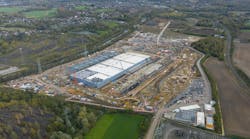The Colossal Future Cloud: Land Deals Hint at Even Larger Data Centers
The cloud needs more land. The largest cloud computing players are aggressively acquiring real estate, provisioning large parcels of land for data center campuses. Recent transactions suggest that some of these server cities will reach colossal scale.
Microsoft has bought 900 acres of property in Mecklenburg County, Virginia near a campus where it operates 1.1 million square feet of data center space in the small town of Boydton. The land deals set the table for a massive future expansion of cloud operations for Microsoft, which is also actively acquiring land in Iowa, Northern Virginia and Phoenix to house more data centers.
As the Internet grows, data centers are becoming a larger part of the landscape in suburban and rural areas. These huge campuses are where the cloud lives – the physical manifestation of the Internet, often located in rural areas offering cheap land and power. Data center hubs enable companies to rapidly add server capacity and electric power, creating economies of scale as more workloads migrate into these massive server farms.
These cloud campuses have been getting larger for some time (as we noted in 2018) and are positioned for even larger scale as the COVID-19 pandemic accelerates the shift to a cloud-powered digital economy.
The Cloud Campus Gets Colossal
The Microsoft land purchases in Southern Virginia in December gobbled up most of the available land in three industrial parks in Mecklenburg County, including the Hillcrest Industrial Park, Roanoke River Regional Business Park and Lakeside Commerce Park. The deals were first reported by the Mecklenburg Sun, which says the effort involved five local economic development agencies.
At 900 acres, the combined parcels are slightly larger than New York’s Central Park, spanning 1.4 square miles of land.
Microsoft has already invested $2 billion in its campus in Boydton, a historic town of about 450 residents near the border of North Carolina. The site is the largest East Coast campus for the Azure Cloud, and one of the largest concentrations of server capacity in the world, ranking third in our 2015 feature on the Top 10 cloud campuses.
The project was started in 2010, and provides a timeline of Microsoft’s data center evolution, housing several generations of designs featuring containerized IT-PAC modules, both in “server sheds” and open air deployments, as well as the traditional data halls in Microsoft’s Generation 5 design.
At 900 acres, the combined parcels acquired by Microsoft are slightly larger than New York’s Central Park, spanning 1.4 square miles of land.
But why Boydton? What made one of the world’s largest tech companies seek out a tiny town in Southern Virginia? The site offered a trifecta of site selection advantages – plentiful land, cheap power and state and local tax incentives on land, power and data center equipment.
A satellite view of the Microsoft cloud campus in Southern Virginia. (Image: Microsoft Bing)
The Boydton campus is also about connectivity. It lies 150 miles due West of the cable landing station in Virginia Beach, where the MAREA subsea cable brings massive amounts of data from Europe. The Trans-Atlantic cable, which is co-owned by Microsoft and Facebook, can stream up to 224 terabits of fata per second, according to recent tests. That data flows across high-speed fiber from Virginia Beach to the Microsoft campus in Mecklenburg County – and from there, out to the Azure cloud and the world.
Land and Expand, at Galactic Scale
The Mecklenburg deals are the largest of a series of land buys by Microsoft as it expands its cloud infrastructure. They reflect a broader trend in which both hyperscale cloud operators and data center service providers are preparing to build ginormous campuses. Some examples:
- Microsoft is developing three large data center campuses near West Des Moines, Iowa, and recently bought at least 170 acres of land for two additional campuses, which could bring another $2 billion in investment to West Des Moines, atop the estimated $3 billion to $5 billion that Microsoft has spent in Iowa.
- Microsoft has also acquired 550 acres of property for campuses in Goodyear, Arizona and about 100 acres for new data centers near Leesburg in Northern Virginia.
- Google recently locked down tax incentives for a new data center on a massive 1,200 acre parcel of land near Reno, Nevada in the Tahoe Reno Industrial Park.
- The Switch Citadel Campus, also in Reno, features a 1.3 million square foot data center building and plans to expand to 7 million square feet.
- Digital Realty plans a massive multi-tenant data center campus on a 424-acre piece of land next to Dulles Airport in Loudoun County, Virginia. The Digital Dulles campus will create 7.5 million square feet of new data center space over a 15-year period.
These huge property deals are the cloud real estate market’s expression of “land and expand” – a term traditionally applied to customer expansion within data halls inside a single building. It has now morphed from companies reserving nearby data halls to devouring nearby land parcels. When data center operators find a development sweet spot with capacity and great economics, you can expect these sites to house larger and larger cloud campuses.
About the Author



